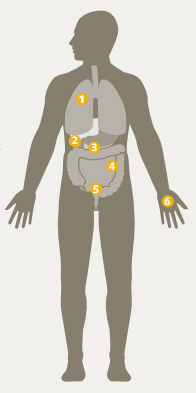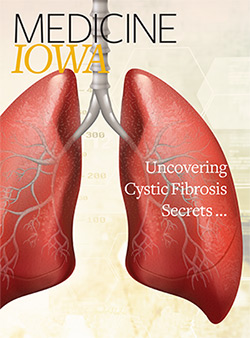Cystic fibrosis (CF) is a life-shortening, inherited condition that affects about 30,000 Americans and about 70,000 people worldwide. CF gene mutations disrupt the function of the cystic fibrosis transmembrane conductance regulator (CFTR) protein, which controls the movement of chloride and bicarbonate ions across epithelial membranes. CF causes bodily secretions to become thick and sticky, interfering with the function of many organs and systems in the human body.
Effects of Cystic Fibrosis
-
 Airways: Thick, sticky mucus clogs air passages, impeding cilia—tiny, hair-like protrusions from cells that line the airways—from removing mucus and inhaled contaminants from the airway. Repeated lung infections can lead to lung damage, causing breathing problems and difficulty getting enough oxygen into the body.
Airways: Thick, sticky mucus clogs air passages, impeding cilia—tiny, hair-like protrusions from cells that line the airways—from removing mucus and inhaled contaminants from the airway. Repeated lung infections can lead to lung damage, causing breathing problems and difficulty getting enough oxygen into the body. - Liver: Bile in the liver and gallbladder is thick and has difficulty moving into the intestine, potentially causing inflammation and scarring of the liver. Pancreas: Because pancreatic secretions are abnormally acidic, digestive enzymes are unable to reach the intestine, leading to incomplete digestion and poor absorption of nutrients. Lack of nutrition prevents normal growth in babies and children.
- Pancreas: Because pancreatic secretions are abnormally acidic, digestive enzymes are unable to reach the intestine, leading to incomplete digestion and poor absorption of nutrients. Lack of nutrition prevents normal growth in babies and children.
- Intestine: The earliest clinical manifestation of CF, occurring in 13% to 17% of infants with CF, is meconium ileus. This bowel obstruction happens when the meconium (the first stool after birth) in a child’s intestine is even thicker and stickier than normal meconium, creating a blockage in the ileum, a part of the small intestine.
- Fertility: 97% of male CF patients and 20% of females are infertile. Thick secretions in the sperm canal can block sperm from getting through. Women are often able to conceive but may have decreased fertility because of thick cervical mucus blocking the entry of sperm.
- Sweat glands: The sweat of people with CF has a high concentration of chloride and sodium. This effect is not harmful but was an indicator in the early days of diagnosing CF.
View other features on cystic fibrosis research

Featured in Medicine Iowa Spring 2018
You're reading one of the features included in the Spring 2018 issue of Medicine Iowa. Read more news and features about the people and programs focused on teaching, healing, and research in the UI Roy J. and Lucille A. Carver College of Medicine.